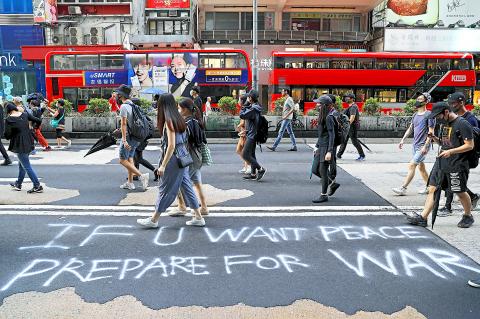Molotov cocktails were yesterday thrown inside a Hong Kong metro station, but no one was injured, the government said, as pro-democracy protesters again took to the streets angry at what they believe is Beijing’s tightening grip on the territory.
The Kowloon Tong station was seriously damaged in the attack, the Hong Kong government said in a statement.
Hundreds of protesters, many young and wearing masks, were marching in Kowloon at the time and were headed to a district near the Kowloon Tong station.

Photo: AP
About a dozen riot police took to the streets in Kowloon’s Tsim Sha Tsui district, normally a haven for local and international shoppers, behind the marchers shortly after news of the Molotov attack.
Hong Kong’s metro has borne the brunt of protests, with stations torched and trashed, and only returned to normal operations on Friday after being completely shut down.
The metro normally carries about 5 million people a day.
Hong Kong’s protests started in opposition to a now-abandoned extradition bill, but have mushroomed in four months into a pro-democracy movement and an outlet for anger at social inequality in the territory.
The protests have plunged the territory into its worst crisis since the UK handed it back to China in 1997 and is the biggest popular challenge to Chinese President Xi Jinping (習近平) since he came to power in 2012.
Hong Kong had experienced relative calm since last weekend, when a peaceful march by tens of thousands spiraled into a night of running battles between protesters and police.
Since then there had only been small nightly protests and advocates had not flagged any major action this weekend.
A small group calling itself the “Silver-Haired Marchers” yesterday began a 48-hour sit-in at police headquarters, describing themselves as “old, but not obsolete.”
“Whilst we may not be able to fight alongside the young protesters in the front line against an unjust government, escalating police violence and indiscriminate arrests, we take it to heart to uphold the core values of Hong Kong and defend the future of our younger generations,” it said in a statement.
Colonial-era emergency laws were introduced a week ago banning masks at public rallies, sparking some of the worst violence since the protests started. Protesters use masks to shield their identities.
However, hundreds of people, including schoolchildren and office workers, have since defied the ban and wore masks.
A group of protesters planned a “mask party” yesterday night.
Hong Kong police, once praised as “Asia’s finest,” are also facing a crisis of confidence amid the worsening political tensions.
Protesters accuse them of using excessive force, a charge police deny, and two protesters have been shot and wounded during skirmishes with police.

INVESTIGATION: The case is the latest instance of a DPP figure being implicated in an espionage network accused of allegedly leaking information to Chinese intelligence Democratic Progressive Party (DPP) member Ho Jen-chieh (何仁傑) was detained and held incommunicado yesterday on suspicion of spying for China during his tenure as assistant to then-minister of foreign affairs Joseph Wu (吳釗燮). The Taipei District Prosecutors’ Office said Ho was implicated during its investigation into alleged spying activities by former Presidential Office consultant Wu Shang-yu (吳尚雨). Prosecutors said there is reason to believe Ho breached the National Security Act (國家安全法) by leaking classified Ministry of Foreign Affairs information to Chinese intelligence. Following interrogation, prosecutors petitioned the Taipei District Court to detain Ho, citing concerns over potential collusion or tampering of evidence. The

‘FORM OF PROTEST’: The German Institute Taipei said it was ‘shocked’ to see Nazi symbolism used in connection with political aims as it condemned the incident Sung Chien-liang (宋建樑), who led efforts to recall Democratic Progressive Party (DPP) Legislator Lee Kun-cheng (李坤城), was released on bail of NT$80,000 yesterday amid an outcry over a Nazi armband he wore to questioning the night before. Sung arrived at the New Taipei City District Prosecutors’ Office for questioning in a recall petition forgery case on Tuesday night wearing a red armband bearing a swastika, carrying a copy of Adolf Hitler’s Mein Kampf and giving a Nazi salute. Sung left the building at 1:15am without the armband and apparently covering the book with a coat. This is a serious international scandal and Chinese

Seventy percent of middle and elementary schools now conduct English classes entirely in English, the Ministry of Education said, as it encourages schools nationwide to adopt this practice Minister of Education (MOE) Cheng Ying-yao (鄭英耀) is scheduled to present a report on the government’s bilingual education policy to the Legislative Yuan’s Education and Culture Committee today. The report would outline strategies aimed at expanding access to education, reducing regional disparities and improving talent cultivation. Implementation of bilingual education policies has varied across local governments, occasionally drawing public criticism. For example, some schools have required teachers of non-English subjects to pass English proficiency

TRADE: The premier pledged safeguards on ‘Made in Taiwan’ labeling, anti-dumping measures and stricter export controls to strengthen its position in trade talks Products labeled “made in Taiwan” must be genuinely made in Taiwan, Premier Cho Jung-tai (卓榮泰) said yesterday, vowing to enforce strict safeguards against “origin laundering” and initiate anti-dumping investigations to prevent China dumping its products in Taiwan. Cho made the remarks in a discussion session with representatives from industries in Kaohsiung. In response to the US government’s recent announcement of “reciprocal” tariffs on its trading partners, President William Lai (賴清德) and Cho last week began a series of consultations with industry leaders nationwide to gather feedback and address concerns. Taiwanese and US officials held a videoconference on Friday evening to discuss the